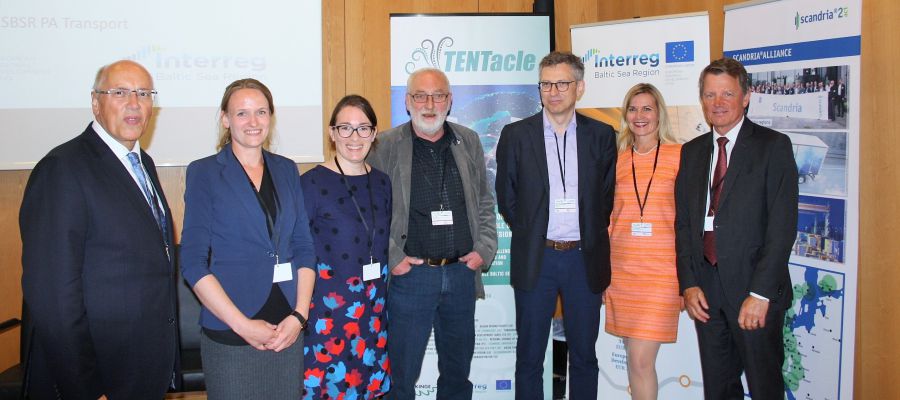
Published 19 Jun, 2017
Regional development along TEN-T-Corridors
Berlin, 14 June 2017
During the 8th Annual Forum of the EU Strategy for the Baltic Sea Region, the three flagship projects TENTacle, NSB CoRe and Scandria®2Act jointly with Priority Area Coordinator Thomas Erlandson organised the seminar "Regional cooperation to connect regions to the TEN-T corridors" with about 70 participants.
Moderated by Silke Brocks, adviser to the European Coordinator for the Baltic-Adriatic Core Network Corridor, Prof. Kurt Bodewig, particpants were invited by the project representatives to discuss their perspective on the issues of multilevel governance, spatial planning and urban nodes in the context of European transport policies.
In his opening statement, Thomas Erlandson presented the objectives and set-up of the Priority Area transport within the EU Strategy for the Baltic Sea Region and highlighted the importance and valuable contribution that bottom-up initiatives as the flagship projects have delivered and will be delivering in future. Wiktor Szydarowski, Region Blekinge, project manager of TENTacle, developed on the added value the regional initiatives could provide to TEN-T Corridor implementation; especially with regard to involve regional stakeholder networks including business, and to accommodate their interests. Malla Paajanen, Helsinki-Uusimaa Regional Council, Project Manager of NSB CoRe pointed at the need to develop a joint transnational vision of regional development along transport corridors, with special regard to the connection of second level nodes and access routes to the network as well as to cross-border areas. Underlining the importance of urban nodes, as the main junctions between corridors and adjacent regions, Horst Sauer, Head of Unit European Spatial Planning at Joint Spatial Planning Department Berlin-Brandenburg, lead partner of Scandria©2Act, called for a functional approach to urban nodes instead of an administrative one, for cooperation between urban nodes in regional alliances and for supporting those regional initiatives that very well add to European Transport Policy objectives.
By splitting up into three moderated "corner discussions", experts and regional politicians from outside the project's partnerships were given the opportunity to bring in their points, challenges, they see from their perspective and needs for cooperation as well as for actions to be taken. Intentionally leaving "traditional" panel discussion format, the seminar actively involved participants and collected their viewpoints.
Within the session on multilevel governance, moderated by Björn Hasselgren, Senior Adviser at Swedish Transport Administration and TENTacle project partner, it was stressed that especially the involvement of national level stakeholders and the businesses into regional cooperation platforms is still insufficient. The difficulties in aligning messages and analyses produced by local and regional actors in cooperation like the BSR-related Interreg-projects and the national planning levels was also discussed. Further, the need to be as concete as possible when accessing business actors from the projects was mentioned.
The participants of the spatial planning group, moderated by Talis Linkaits, head of the VASAB secretariat and NSB CoRe project partner, discussed the added value of a spatial vision for the North Sea - Baltic Corridor. They concluded, that a spatial vision could foster economic development by improving cross-border cooperation and stakeholder involvement.
The urban node group, moderated by Ulrike Schütz, Joint Spatial Planning Department Berlin-Brandenburg and Sven Friedrich, INFRASTRUKTUR & UMWELT Prof. Böhm und Partner; Scandria®2Act project manager; identified main challenges, such as a definition of scope for urban nodes as well as the necessary understanding and organisation of processes or the usage of an intelligent mixture of public and private financial resources.
In her summary, Silke Brocks stressed that the European Commision treats regional initiatives very serious and positive. She confirmed the need for a better alignment of European funding instruments. She also signalised, that the Corridor Coordinators will address horizontal challenges like urban nodes as well as clean fuels that have much relevance for the regional level in future.
Closing the session, Thomas Erlandson expressed his hope to continue the very valuable and fruitful dialogue between EUSBSR PA Transport, the European Commission, the flagship projects and regional stakeholders in the Baltic Sea Region.
Finally participants as well as organisers took away many relevant points and ideas; looking forward into upcoming discussions in the Baltic Sea Region related to transport policy and Transeuropean Transport Networks.
Further info is available via the sister projects' websites (www.uudenmaanliitto.fi/nsbcore and www.scandria-corridor.eu) and
Katja Höltkemeier
Port of Hamburg Marketing
E-Mail: hoeltkemeier@hafen-hamburg.de
All photos copyright: Gemeinsame Landesplanungsabteilung Berlin-Brandenburg
Tweet